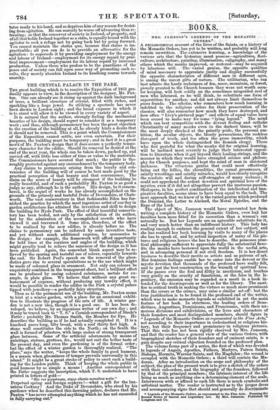THE CRYSTAL PALACE IN THE PARK.
THE great building which is to receive the Exposition of 1.851 gra- dually appears to view, in the description of the designer, Mr. Pax- ton. One can already see it rising up against the dark background of trees, a brilliant structure of crystal, filled with riches, and sparkling like a huge jewel. So striking a spectacle has never been shown to London sight; and the broad expanse in which it is to stand will allow it to be viewed in every variety of aspect.
It is natural that the author, strongly feeling the mechanical beauties of his design, should regret to consider it as a temporary work ; and thus, although permanency has been the great objection to the erection of the building at all, he already hints a desire that it should not be removed. This is a point which the Commissioners of the Exposition cannot settle, nor even entertain. For their purposes, the building must be temporary; and in fact it is a great merit of Mr. Paxton's design that it does secure a perfectly- tempo- rary character for the edifice. Should its removal be desired at the end of the next year, the whole can be taken down, packed up, and carried off, with little loss either of time or value to the materials. The Commissioners have secured that much ; the public is tho- roughly protected against any encroachment by the temporary body. Any claims to permanence arising from the beauty and con- venience of the building will of course be best made good by the practical perception of that beauty and that convenience. The claim on the score of beauty will be strongest if the building be really beautiful, and of such a probability Mr. Paxton is as good a Lidreged, as s etre, although hwelsth jeleathasoileolEdflys acdecsoignagehietareomn ege-
greunds of the princely and tasteful Duke of Devonshire, at Chats- worth. The vast conservatory in that fashionable Eden has fur- nished the practice by which the most ingenious artist of our day in garden architecture has attained the invention and skill to design the building for Hyde Park. The effect of that beautiful conserva- tory has been tested, not only by the satisfaction of its author,
hut by the admiration of the accomplished crowds who have -viewed it and traversed it. Some idea, therefore, of the effect to be realized by the new edifice, is already before us. The
claims to permanency can be enforced by some inventive taste, and yet without much additional expense, by accessories to
the design: for example, the framework will afford opportunity
for bold lines at the cornices and angles of the building, which might greatly tend to relieve the sameness of the design as it has been published. Again, the somewhat blank aspect may be re- lieved by the sparing and tasteful use of colour, especially towards the end. Sir Robert Peel's speech on the removal of the glass- duties gave rise to several speculations as to the use which might be made of coloured glass in ornament. Not only can colours be exquisitely combined in the transparent sheet, but a brilliant effect
can be produced by casing coloured substances, metals for ex- ample, in plate glass. We believe that without any great en- hancement of expense, without producing any tawdry effect, it would be possible to render the edifice in the Park a crystal palace tipped with jewellery—a perfectly fairy structure.
Then as to the permanent use of the building, Mr. Paxton seems to hint at a winter garden, with a place for an occasional exhibi- tion to illustrate the progress of the arts of life. A winter gar- den is not a new idea, though it is a good one. It has been de- veloped, we believe, by an ingenious writer of our own day ; and it may be traced back to "T. S." a Cornish correspondent of Steele's
Tatler ; probably Mr. Thomas Smith, the Member for Eye. He describes the building as if he had actually completed it It is a
hundred paces long, fifty broad, with a roof thirty feet high. A stone wall constitutes the side to the North; on the South the wall is formed of pilasters, with large sashes of strong transparent
glass between. Some of the artificial adornments by means of paintings, statues, grottoes, 8ce., would not suit the better taste of the present day, and even the gardening is of the formal order; but the effect of a winter garden is thoroughly realized. "The place," says the writer, "keeps the whole family in good humour,
in a season when gloominess of temper prevails universally in this island." It might be a great stroke of policy to erect such a build-
ing for the London public. Think of keeping the whole public in good humour by so simple a means ! Another correspondent of the Taller suggests the inscription, which T. S. undertook to have printed in letters of gold— "lie ver perpetuum, atque alienis mensibus testis." Perpetual spring and foreign zephyrs !—what a gift for the lux- urious Cockney! And the Duke of Devonshire, who stood by his gardener when he described this dawning palace, declares that Mr. Paxton"has never attempted anything which he has not succeeded in fully carrying out."


























 Previous page
Previous page